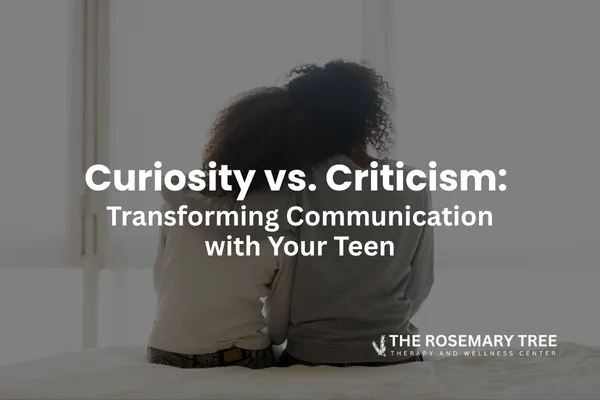
Curiosity vs. Criticism: Transforming Communication with Your Teen
As parents, we often want to know what’s going on in our child’s life—especially during the adolescent years, when friendships, activities, and priorities shift quickly. Yet the way we ask questions can either open the door to honest conversation or close it. Jason Ellis, therapist and co‑founder of The Rosemary Tree, shares the power of choosing curiosity over criticism and how it can strengthen your relationship with your teen.
Curiosity vs. Criticism: What’s the Difference?
Curiosity comes from a place of genuine interest and a desire to understand your child’s experiences, feelings, and perspectives. It says, “I care about you and want to learn more.” Criticism, on the other hand, often stems from judgment or assumption. It can feel like a one‑up position—“I already know the answer, and I’m skeptical of your choices.” While curiosity invites openness, criticism can trigger defensiveness and shut down communication.
Why Tone and Facial Expressions Matter
It’s not just what you say—it’s how you say it. The tone of your voice and your facial expression convey your underlying attitude. A neutral or warm tone paired with a relaxed expression signals curiosity and encourages your teen to share. A sharp tone, narrowed eyes, or raised eyebrows may come across as accusatory, even if your words are harmless. Before you ask a question, take a moment to soften your tone and set your face to reflect genuine interest rather than skepticism.
Practical Examples: Tweaking Your Delivery
Consider these common questions and how subtle shifts change their impact:
Curious: “Hey, what are you doing later?” (asked with a calm tone, open expression)
Critical: “What are you doing later?” (tone sharp, eyebrows raised)
Curious: “Who are you going to that thing with?” (genuinely interested)
Critical: “Who are you going with?” (implied disapproval)
Practice saying your questions out loud and notice how your facial expression and tone influence the message. Aim for a posture that feels inviting rather than interrogative.
Benefits of Choosing Curiosity
When teens feel judged, they often shut down or become defensive. Curiosity keeps the conversation flowing. By asking open‑ended questions and truly listening to the answers, you:
Build trust and strengthen your relationship.
Learn more about your teen’s thoughts, feelings, and choices.
Encourage them to reflect on their experiences and emotions.
Model empathy and respectful communication, skills they’ll carry into their own relationships.
How to Cultivate Curiosity in Parenting
Pause and Reflect – Before speaking, ask yourself if you’re truly curious or if you’re projecting fears or assumptions.
Use Open‑Ended Questions – Instead of yes/no questions, try “How did that go?” or “What was the best part of your day?”
Mind Your Body Language – Relax your shoulders, maintain gentle eye contact, and avoid closed‑off postures.
Validate Feelings – Acknowledge your teen’s emotions before offering advice. “That sounds frustrating. Tell me more.”
Practice Active Listening – Focus on what your teen is saying rather than preparing a response. Repeat back what you hear to show you understand.
Stay Calm Under Pressure – If a conversation becomes heated, take a break and return with a calmer mindset. Curiosity can’t thrive in the midst of anger.
Final Thoughts
Choosing curiosity over criticism is a simple yet transformative shift. By paying attention to your tone and facial expressions and approaching your teen with a genuine desire to understand, you create space for deeper connection and honest dialogue. It’s a practice that takes awareness, but the reward is a stronger, more trusting relationship—and a teen who feels seen, heard, and respected.
